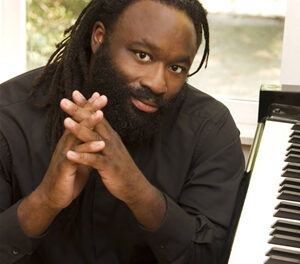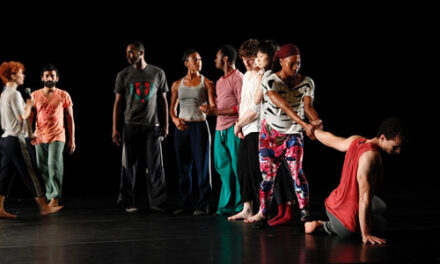The UNC Department of Music, UNC Opera, and UNC Baroque Ensemble presented Handel’s scintillating opera Alcina in Hill Hall. A troupe of talented performing and technical artists put together a charming production of one of Handel’s masterful and tuneful operas. Alcina is filled with musical riches – and intriguing magic as well.
Alcina is a potent sorceress who is skilled in the art of seduction. Her passions run hot until she tires of her conquests, at which point she turns them into wild beasts or stone. Bradamante has bravely come to the sorceress’ domain on her quest to rescue her lover Ruggiero from Alcina’s spell. If she succeeds they will escape and, no doubt, live happily ever after.
The stage was nicely set as an opulent room in Alcina’s palace on an island in the middle of the ocean. Then, in the second act, the room was stripped of all furniture and decorations leaving only a plain white wall. Alcina has discovered that she truly loves Ruggiero, and experiencing love in human (real) terms means she loses her magical powers. Also, Ruggiero has avoided Alcina’s grasp and is now back with Bradamante, leaving Alcina bleakly alone on the blank stage.
Stage direction and design was by Marc Callahan and lighting, by Aimee Comanici. The production stage manager was Dawn Locklear and her assistant was Aspen Jackson. Musical direction was provided by Brent Wissick with Qiao Zheng Goh who also together provided cello and harpsichord continuo for recitatives.
The choral ensemble was comprised of Caroline Collins, Hannah-Grace Keel, Emily Hynes, Aspen Jackson, Hannah Lawrence, Kayla Richardson-Piché, and Mackenzie Smith. They were representatives of Alcina’s former loves whom she had turned into monsters; when Alcina lost her power they were restored to their true selves. They played their roles effectively and sang their choruses charmingly.
The leading characters were sung by alternate singers on the two performance dates. These were the performers for November 10:
Alcina was sung by Susannah Stewart. Her smooth velvety soprano voice was consistently in control. The cold-hearted, indifferent Alcina of the first act and the human, despairing Alcina of the second act were conveyed beautifully.
Morgana, Alcina’s sister, was interpreted delightfully as a saucy and playful version of her sister by Katherine Thompson. She tripped through the upper soprano register as a colt in a fresh meadow in springtime.
Ruggiero, a soldier, was sung convincingly by Abigail Lloyd. No matter what challenging situations (he) found (himself) in, her voice was stalwart and true. Her rendition of the famous aria “Verdi prati” (Green meadows) was a highlight.
Bradamante, Ruggiero’s betrothed, was sung by Caroline Stanton. Her strong soprano voice rang true in the heroic role as she and Melisso tried to break Alcina’s spell on Ruggiero.
Melisso, Ruggiero’s tutor, was sung by Patrick Dow. His big baritone voice filled the auditorium as he and Bradamante tried to help Ruggiero see through the illusions of Alcina’s magic.
Oberto, a boy in search of his father, was sung by Sophia Barsanti. She used her solid and straight-forward voice as she accused Alcina of being a barbaric woman.
Oronte, Morgana’s lover was sung by Madeline Lillich. He rebuffed Morgana as she tried to rebuild their relationship. But when Morgana left the room, he admitted he loved her still.
The cast was uniformly competent and clearly well-prepared for the performance. All had some difficulty with Handel’s florid melismatic passages but got through them to the best of their abilities. The overall production concept was clear and well-executed. This proved to be a charming entertainment for an appreciative opening night crowd.












